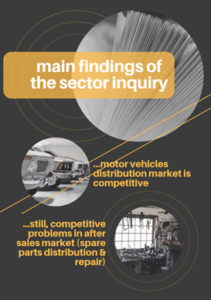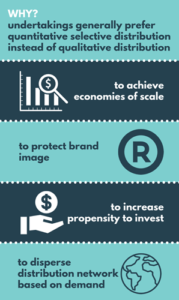With the introduction of the Regulation on Vertical Agreements in the Motor Vehicle Sector (Regulation no 2017/3) in February 2017, the Turkish Competition Authority (TCA) differentiated its approach to the distribution agreements in relation to new motor vehicle sales markets and after sales services markets. Different from the previous regulation, the TCA adopted a more flexible attitude in the assessment of distribution agreements in the new motor vehicle sales market, while preserving its relatively strict point of view in the after sales services market in accordance with EU regulations. Moreover, the TCA declared a single 30 percent market share threshold for both the sales market and the after sales services markets in Regulation no 2017/3, which abandoned the separate thresholds system implemented during the previous regulation period.

Accordingly, undertakings operating in the motor vehicle industry have been starting to reconsider their distribution agreements in sales and/or after sales services markets in order to benefit from the changing policy of the TCA. In particular, during the course of 2018, we have had the opportunity to examine the first decisions of the TCA in relation to Regulation no 2017/3. Before examining the recent decision of the TCA on distribution agreements of Renault and Dacia, it would be beneficial to mention briefly some of the factors that led the TCA to form the changes in Regulation no. 2017/3.
Background
Since 1998, starting from the implementation of the first block exemption regulation, the TCA has a long tradition and experience of application on the motor vehicle industry. In 2005, the TCA replaced that regulation with Regulation no 2005/4 in order to achieve the aim of reaching out a more competitive market structure. To achieve this ultimate goal, the TCA put stricter and more detailed route maps for undertakings in the motor vehicle industry without making any differentiation between the sales and after sales market in accordance with the implementation in the EU.
After nine years of implementation, the TCA conducted a sector inquiry in order to encounter the problems of the industry and to understand better how successful was each regulation introduced by the Regulation no 2005/4 to achieve its ultimate goal about the increasing competitiveness in the market. The main findings of the sector inquiry, which were based on an in-depth analysis and surveys conducted with a wide range of participants, revealed the need for differentiation between new motor vehicle distribution and after sales market. Having said that, the results of the sector inquiry clearly depicted that during the implementation of Regulation no 2005/4, the new motor vehicles distribution market had a rather competitive structure, whereas competitive problems and concerns existing before the aforementioned Regulation persisted in relation to maintenance and repair services provision and spare parts distribution activities. It could not be wrong to say that this landscape of the motor vehicle market constructed a fundamental base for the renewal of Regulation no 2005/4.

The findings of the sector inquiry contributed to the studies on the preparation of Regulation no 2017/3, and the new Regulation allows suppliers to establish more flexible distribution networks (i.e. removing obligations on multi-branding and opening of additional points of sales) in the sales market of new motor vehicles. On the other hand, in relation to the after sales market, Regulation no 2017/3 preserved regulations of Regulation no 2005/4 about encouraging private service shops to become alternative players in the market in order to enhance competition in the relevant market by putting quality and price pressure on authorized distributors and authorized service stations. Similarly, provisions concerning multi-branding and restrictions on opening additional facilities continued to be regulated separately from sales activities.
Additionally, the findings of the sector inquiry revealed that the separation of market shares for undertakings to decide on their formation of distribution system (i.e. whether to implement qualitative selective, quantitative selective or exclusive distribution) did not provide any efficiencies; on the contrary, different thresholds might lead to difficulties for market players. Therefore, the TCA declared a single 30 percent threshold after considering market shares of the undertakings in the market in order to simplify the system. Finally, yet importantly, the TCA gave detailed explanation in the guideline of the Regulation no 2017/3 on how to calculate market shares in new motor vehicle distribution and after sales services markets.
Remarks on the TCA’s Renault and Dacia decision
We have had the opportunity to review a few decisions of the TCA after the implementation of Regulation no 2017/3. In this regard, we believe that the findings and interpretations of the TCA are of importance in order to have further and better understanding of the approach of the TCA towards the motor vehicle industry.
From the recent decision of the TCA, we have understood that at the end of 2017, Renault applied to the TCA and requested exemption to implement a quantitative selective distribution system in relation to after sales market of both its Renault and Dacia brands instead of its current qualitative selective distribution system. Why the undertakings preferred changes to their distribution system can be seen from the definition of two different schemes. In qualitative selective distribution system, distributors are selected based on objective criteria required for the nature of service to be supplied, and suppliers have to allow all distributors meeting those criteria to operate under the framework of the network. On the other hand, in order to adopt a purely quantitative selective distribution system, suppliers have the right to make use of certain criteria that can directly limit the potential number of direct sellers. In this regard, undertakings operating in the motor vehicle industry generally have a tendency to prefer quantitative selective distribution instead of qualitative selective distribution system in order to achieve economies of scale, to protect brand image, to increase propensity to invest and to formulate dispersion of its distribution network based on the demand structure for each region.
Accordingly, Renault wanted to have a change to its distribution system for two of its brands and requested exemption from the TCA. After a lengthy examination period, the TCA denied the request for Dacia brand and granted exemption solely for Renault in June 2018.
From the decision of the TCA, we have noticed that Renault emphasized that Renault and Dacia were mainly operating and giving service to their clients in the common authorized distributors and authorized service stations. In addition, Renault claimed that 13 percent of the spare parts can be used for both Renault and Dacia brands, and the amount of those spare parts on the total spare parts sales of two brands for 2016 was 62.75 percent. Accordingly, the parties would like to change their qualitative selective distribution system to quantitative selective system and to benefit from exemption for both brands. Before moving to market threshold analysis of the TCA, we would like to point out that the TCA did not accept the substitutability argument of the parties on Dacia and Renault spare parts in the notification.
Although the TCA accepted the economies of scale argument in using authorized distributors and authorized service stations commonly by both brands, the TCA could not find a common ground with the parties on their claims about using 13 percent of their spare parts together. At this point, the TCA stressed the importance of demand substitutability and argued that after sales services of both brands under warranty are continued to be held by authorized distributors and authorized service stations. Hence, the TCA preserved its previous approach on defining the relevant market based on each brand and evaluated the exemption request for each brand separately.
Moving on, in order to clarify whether it is possible to implement quantitative selective distribution system instead of qua  litative selective distribution system for Renault and Dacia brands, the TCA calculated the market shares of those brands with respect to the declared instructions in the guideline of the Regulation no 2017/3. In this regard, the TCA estimated the market share of each supplier within the spare parts/maintenance and repair market by finding the proportion of the concerned vehicle supplier’s turnover generated from the sales of the spare parts/maintenance and repair for those brand vehicles during the relevant period to the total turnover generated by all undertakings operating in the relevant market from the sales of the spare parts/maintenance and repair for those brand vehicles during the same period. The TCA also crosschecked its and parties’ market findings with the figures collected from the Turkish Statistical Institute.
litative selective distribution system for Renault and Dacia brands, the TCA calculated the market shares of those brands with respect to the declared instructions in the guideline of the Regulation no 2017/3. In this regard, the TCA estimated the market share of each supplier within the spare parts/maintenance and repair market by finding the proportion of the concerned vehicle supplier’s turnover generated from the sales of the spare parts/maintenance and repair for those brand vehicles during the relevant period to the total turnover generated by all undertakings operating in the relevant market from the sales of the spare parts/maintenance and repair for those brand vehicles during the same period. The TCA also crosschecked its and parties’ market findings with the figures collected from the Turkish Statistical Institute.
As a result, the TCA once again stated that integrated qualitative selective distribution agreements for both brands could not benefit from block exemption, since the market share of Dacia authorized services and authorized service stations was above the 30 percent threshold level that is stated in Regulation no 2017/3. Additionaly, individual exemption assessment of the TCA also reached the same conclusion, and the TCA emphasized the significance of competition in the after sales market of Dacia due to its higher market share. However, the TCA concluded that Renault distribution agreements could benefit from block exemption separately from Dacia distribution agreements since Renault can maintain the threshold for the implementation of quantitative selective distribution system.
The main reasoning that differentiates the market share estimation for Renault and Dacia stemmed partly from the liberalization period of Turkey. Renault and Fiat were the two local licensed manufacturers of Turkey during the 1980’s (when footsteps of liberalization occurred) until 1996 (lessening of tariffs with the entrance of Turkey to Customs Union in 1996). That unique situation of two companies contributed to the increasing number of private service shops that could offer spare parts and repair services to Renault and Fiat branded cars after the warranty period. In this respect, the number of vehicles in the vehicle fleet of Renault and Fiat brands and the number of private service shops that service Fiat and Renault are relatively higher than other brands, which can affect the market share estimations.
In light of the attitude of the TCA, in its assessment of Renault and Dacia distribution systems, we can clearly comprehend the determination of the TCA to enhance the competitive structure in the after sales services market.


